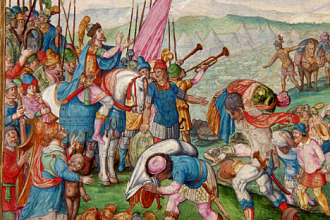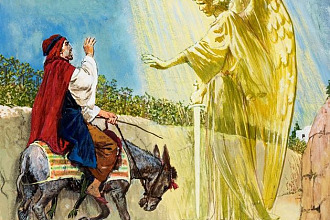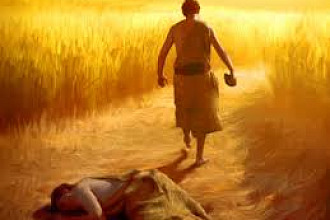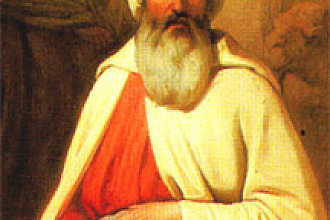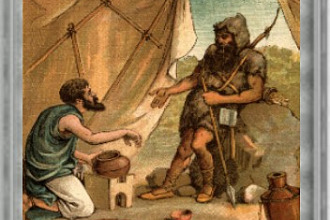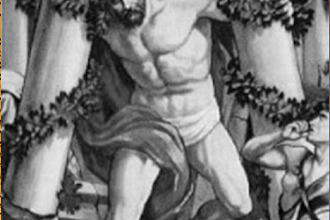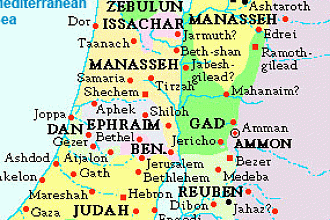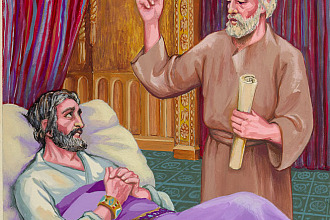Considering the importance of the prophet-hakham Daniel, Shabbat Shalom has chosen to hear from several voices within Jewish tradition who not only praise the book, but also teach from and about it. Hermann L. Strack, in Introduction to the Talmud and Midrash (1945), defines Jewish tradition, or Mishna, as "the oral lore or the body of ancient Jewish traditional learning [which] is of a threefold variety: (a) Midrash, exposition of the Scriptures, particularly of the Pentateuch; (b) Halakoth, traditional statements of law, in categorical form, without regard to their derivation from the Scriptures; (c) Haggadoth, scriptural expositions of a non-halakic character, proverbs, parables, narratives" (3).
Shabbat Shalom: Daniel was a real person who lived in the fifth century B.C.E. Which tribe and family do the ancient rabbis say that Daniel belonged to?
Jewish Tradition: "Daniel was from Judah and of royal descent" (Sanhedrin 93b; Chidushey Aggadoth Maharal).
Shabbat Shalom: How was Daniel regarded by the ancient rabbis?
Jewish Tradition: "If Daniel were in one scale of the balance and all the wise men of the nations in the other, he would outweigh them all" (Yoma, 77a).
Shabbat Shalom: According to the rabbis, why did Daniel hold a special place in Israel?
Jewish Tradition: "Two advocates that arose to defend Israel and set themselves, as it were, against the Holy One, Blessed be He, were Moses and Daniel" (Shemot Rabbah, 43, 1).
Shabbat Shalom: The book of Daniel also holds an important place in Jewish tradition. Why is this book so important?
Jewish Tradition: "Daniel was one of the greatest prophets, because he was not only able to predict future things, as did the other prophets, but he also determined the time of their accomplishments" (Flavius Josephus, Antiquities, X, 7). "To only two people did the Holy Blessed be He, reveal the end (qets): to Jacob and to Daniel" (Midrash Shocher Tov 31:7).
Shabbat Shalom: Is it then possible to know the time of the end?
Jewish Tradition: No. "After an angel showed Daniel everything, he had him forget the time of the end" (Bereshit Rabbah, 98:2).
Shabbat Shalom: Did the ancient rabbis approve of calculating the coming of the Messiah?
Jewish Tradition: "R. Shemuel bar Nahmani said in the name of R. Yohanan: 'May the bones of those who calculate the time of the coming of the Messiah at the time of the end, be blown away! For as soon as the time [calculated by them] arrives and the Messiah did not come, they say that He will no longer come at all. Rather, wait for Him, for it is said, "Though He tarry, wait for Him" (Hab. 2:3),'" (B. Sanhedrin, 97b).
Shabbat Shalom: In Dan 2, Daniel interprets the king's dream of a great statute. In Dan 7, Daniel himself dreams of four strange animals. What do the four metals of the statue in Dan 2 and the four animals in Dan 7 represent?
Jewish Tradition: The head of gold and the lion represent "Babylon" (Vayikra Rabbah 13:5). "The eagle's wings [on the lion] represent the great speed and energy which were the Babylonians' hallmark" (Mayenei Hayeshua 8: 2).
The breast of silver and the bear "are the Persians, who eat and drink ravenously like a bear and are corpulent like a bear" (Kiddushin, 72a).
The leopard "represents Greece" (Bereshit Rabbah, 13:5). "The wings symbolize Alexander's speed in making great conquests in all four points of the compass" (Abarbanel, 8, 3 and Ibn Yachya). The rabbis say in regard to the copper belly of the statute: "Like the sound of the copper the third kingdom will resonate throughout the whole world" (Mayenei Ha Yeshuah, 6:1).
The legs of iron later mixed with clay and the fourth animal with its little horn "is Rome, which undergoes a metamorphosis from the secular power of the old empire into the religious power, Christianity. The powerless orphan adopted by the mighty empire, originally by Emperor Constantine and later by his successors, grew up to utilize its unique position as a state religion of the great empire. Its power, temporal or spiritual, eclipses that of kingdoms and empires. Thus throughout our exile, the fourth kingdom is represented by the Christian Church" (Art Scroll Tanach Series, Daniel, 105). "The fourth kingdom represents both Christianity and Islam" (Saadia Gaon, cited in Ibn Ezra in Miqraoth Gdoloth, ad loc., Avodah Zarah, 2b etc.).
Shabbat Shalom: What do the stone in Dan 2 and the Son of man coming with the clouds in Dan 7 represent?
Jewish Tradition: "The kingdom of God which will be ruled by the Messiah" (Rashi in Miqraoth Gdoloth ad loc.). "It is the Messiah King who will come one day and reign over the world from one extremity to another, as it is said in Daniel 2:35, 'the stone that struck the image became a great mountain and filled the whole earth'" (Pirqey Rabbi Eliezer, Per. 11).
Shabbat Shalom: Who is the person in Dan 9 who "will bring everlasting justice"?
Jewish Tradition: "It is the Messiah King" (Bereshit Rabbati, 14:18).
Shabbat Shalom: Daniel 12:1 states: "At that time Michael, the great prince who protects your people, will arise." Who is Michael?
Jewish Tradition: "He is the one who stands innermost, i.e. closest to the Holy Presence" (Bereshit Rabbah, 21:1).
Shabbat Shalom: How should we interpret the "weeks" in the 70 weeks prophecy of Dan 9?
Jewish Tradition: "This expression means 49 years, that is seventy weeks of years" (Seder Olam ch. 28; cf. Ibn Ezra in Miqraoth Gdoloth, ad loc.).
Shabbat Shalom: Daniel spoke much about prophecy in his book. But he was also a man of prayer. What lessons about the practice of prayer might we learn from him?
Jewish Tradition: "We would think that the institution of daily prayer started when he went into exile; therefore it is said about Daniel that he 'prayed and gave thanks before his God, as was his custom since early days'" (Berachot, 31a).
Shabbat Shalom: How often and on what occasion did the Jews read the book of Daniel?
Jewish Tradition: "Zechariah b. Kabutal says: At the Day of Atonement (kippur), I used to read from the book of Daniel many times" (Yoma, 1, 5).
Shabbat Shalom: Why should we read and reread the book of Daniel?
Jewish Tradition: "I love to read and reread it. Because of its beauty? Because of its danger? Indeed, it is impossible to decipher its secret, but at least we know it has a secret—this knowledge enables us to give hope a name which precedes Creation itself" (Elie Wiesel, Sages and Dreamers, 114).








